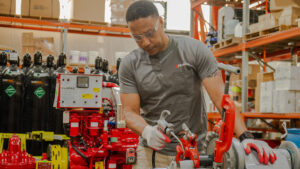
If you’re reading this, you’re probably a bit curious as to what a deluge fire system is.
If you’re reading this, you’re probably a bit curious as to what a deluge fire system is. A deluge fire suppression system is a type of dry sprinkler system. This means there is no water stored within the piping network. A typical deluge system has a control valve and a dedicated water supply. It is typically designed with open heads controlled by smoke, heat, or flame detectors. These systems are installed in high-hazard areas where fires might start or spread quickly. Unlike traditional wet sprinkler systems, sprinkler heads, or more accurately deluge nozzles, are usually open, so large amounts of water can be discharged on a fire. Read on to learn all about deluge fire suppression systems.
How Are Deluge Systems Activated?
Sprinkler heads on a deluge system are more accurately called deluge nozzles. They are engineered to operate simultaneously. The water valve is released by a signal from the detection control panel. Once turned on, water is released into piping and out of the nozzles. Since there isn’t any water in the piping and all the nozzles are open, a detection and control system is needed for activating the system. Deluge systems can also be released through pneumatic means.
What Are the Types of Deluge Fire Systems?
There are many types of deluge systems. Some are electrically operated so that once an alarm is initiated through a detector or manual pull station, it will energize a solenoid valve that releases the water into the valve and allows the deluge system to deliver water to the hazard. Pneumatic deluge systems use a small airline with traditional sprinkler heads as the primary detection method. In case of a fire, the sprinkler heads on the small detection airline are activated, depleting air in the line, which allows the pneumatic actuator to release water from the valve and allows the water to be delivered to the hazard.
Applications for Deluge Systems
Due to the massive amount of water discharged from a deluge system, they’re highly effective in both cooling and extinguishing large scale fires. Water additives such as low-expansion foam can also be added for special hazards. These systems are usually found in applications such as power generation, chemical manufacturing, or petrochemical plants.
Fire Protection Services from Fireline
Whether you need smoke detectors, fire extinguishers, or an automatic sprinkler system installed at your commercial property, Fireline has you covered. We have been protecting people and property from fire damage since 1947—and our experience shows in our excellent work! We are known for our superb customer service, our expertise, and our reliability. For more information on how we can help your residential or commercial property, visit us online or give us a call at (800) 553-3405. We are located in Baltimore, MD, with a second office in Leesburg, VA. For more fire safety tips, be sure to follow us on Facebook, Twitter, and LinkedIn.
